You'd Have To Be Crazy
Homelessness in Seattle.
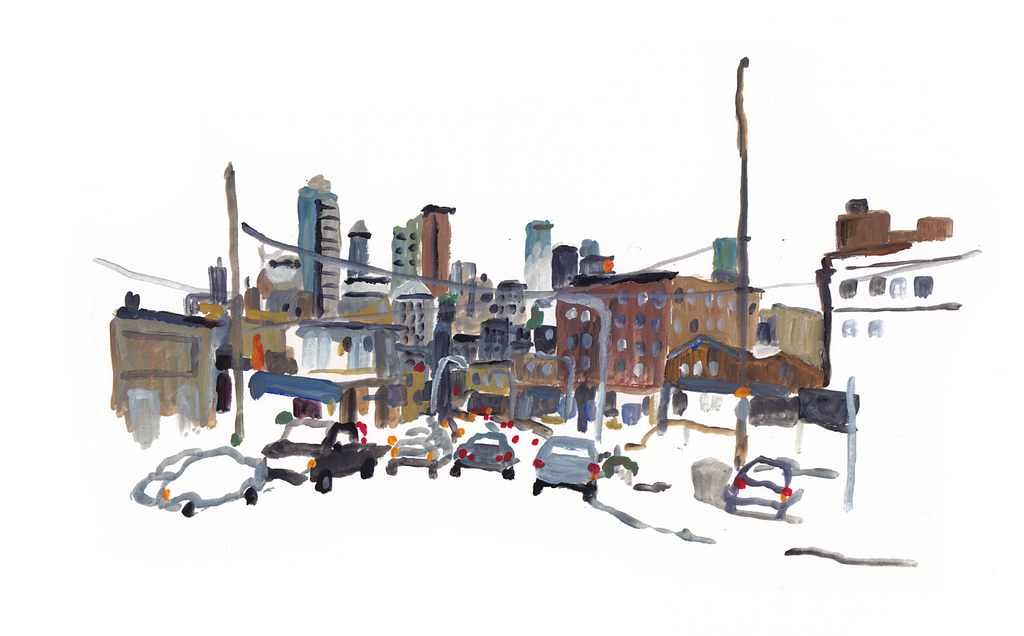
Seattle has a strikingly visible population of homeless people. One out of three of them are mentally ill, which is strikingly visible too. Lately though, rents are skyrocketing, and people are being priced out of their neighborhoods.
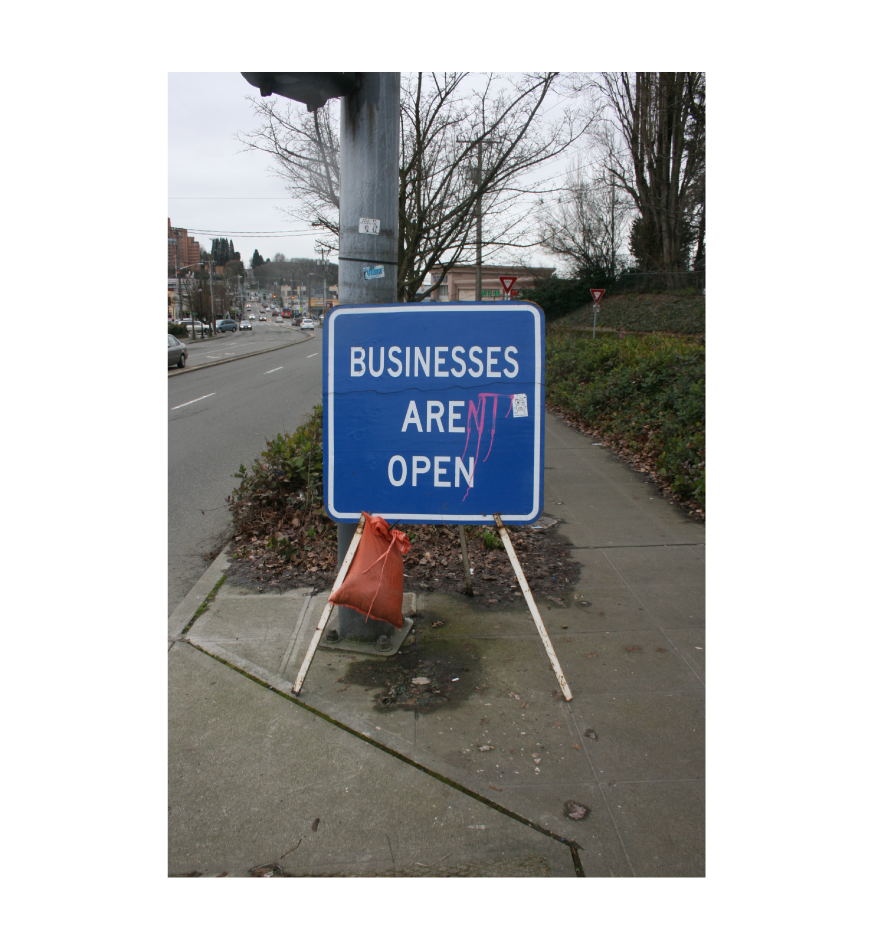
There was a whole section of North Seattle that was being torn down and built up again. In the middle it is the headquarters of Amazon. At lunchtime, all of the workers of Amazon came down out of the buildings and ate at food trucks and noodle restaurants and talked on their cell phones about deals and talked to each other about rent prices. All around the Amazon area, there were signs with messages about condos and places to live with phone numbers for qualified buyers to call.
I was too nervous to talk to the Amazon people, so I walked around there and eavesdropped on their conversations. I heard one lady telling a man that she moved to Seattle from Pennsylvania, leaving her boyfriend behind. She said they realized that they never spoke to each other, they just worked all the time. Even after they got home, they would just stare at their screens, so they realized it would be better to just live in separate states. I thought that was so odd, but the man agreed. He said that he and his wife had reached the exact same conclusion.

Outside the Amazon headquarters was a covered wooden stand with two people giving out free bananas. When I asked them what they were doing, they said, “It’s a PR thing.” I asked what the message was, and they told me about the good features of the banana, and that it kind of looked like an Amazon logo.
All over Seattle, there were big white signs that said “Proposed Land Use Action.” The signs were there to tell the city that a building was about to be smashed, and a new building was coming in, so don’t complain. They had a big paragraph of text about the features of the new building, and then they typically listed a meeting where citizens could complain about it.
Almost everyone in this area, if he or she was talking on a cell phone, was talking aggressively about a work related matter. They were saying things like “Tell them I don’t give a fuck.”

Almost any resident of Seattle will say that these are the people are driving up rents and changing the character of the city. They are wandering into Seattle in high numbers from everywhere, taking big salaries, and moving into the high-rent condos that are being built on top of the ruins of the previous city. They are patronizing boutique stores.
Some people call them Amazombies.
The van lifestyle is a major trend. One woman said she knew a rich man, a bitcoin multi-millionaire who lived in a van. He couldn’t stand modern society, she said. He was so rich that when a homeless man beat him at ping pong, he went out and bought the world’s best ping pong paddle to get a tactical advantage. It even had its own case, she said, and it improved his game. He had a hundred million dollars, she said. He hired his own raw vegan chef, and spent four thousand dollars a month on supplements. He was a transhumanist.

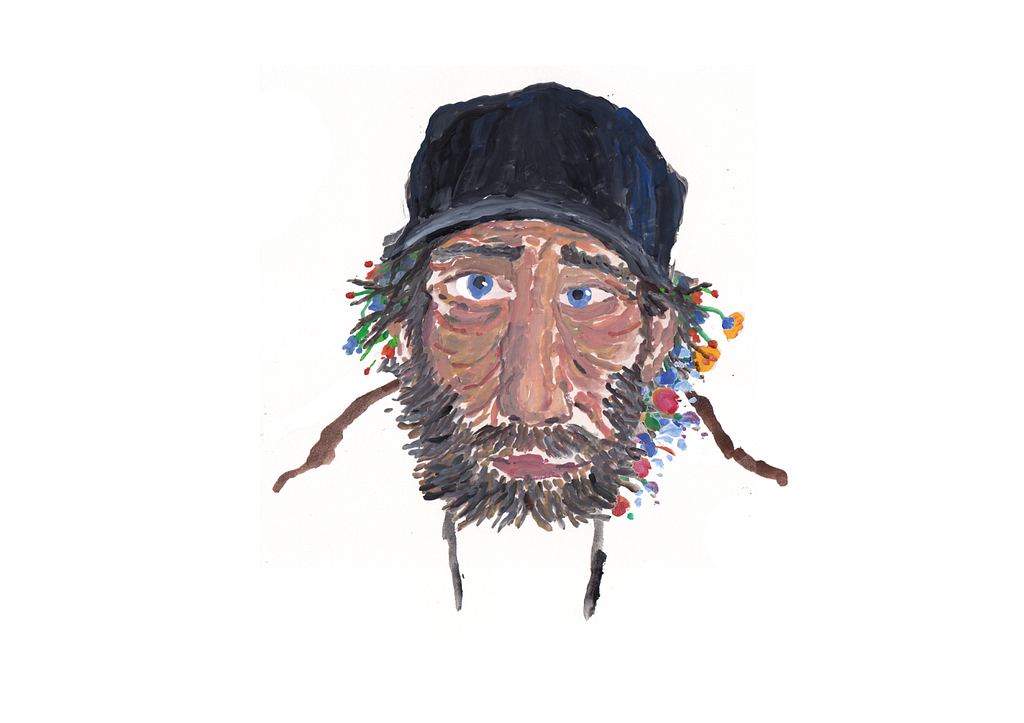
“Born in California. High school, graduated. Year later, moved up to Oregon. My dad was a World War Two vet, in Iwo Jima, where they raised the flag on the island,” said David. “He was in a fox hole on that island. He used to beat me every night, with a belt. Because I’m all wired, right? I was a little kid jumping around and playing. He’d have to strap me to set me straight, and get me to go to sleep. Even when I went to jail, they had to whip my ass to calm me down. Once you whip my ass, then I’m good. I’m fifty-five. I don’t do drugs, and that’s the reason why I’m able to walk around. Take a look at a heroin addict. That shit’ll eat ya up.
I joined the service when I was like twenty-one. For discipline. My dad said, ‘Son, I don’t know what to do with you. I’m tired of beatin’ on ya. I was a combat medic. Then I was still young. Twenty-four or twenty-five by the time I got out. And then dad died. So I flew back to L.A. And we had a big house, $85,000, back in the day. And they sold it, each of us got a part of it. Dad always told us, ‘Now look: This is your kids’ house. When I go, you guys are gonna inherit this. You guys invest in a business or property. They can’t take property away from you.
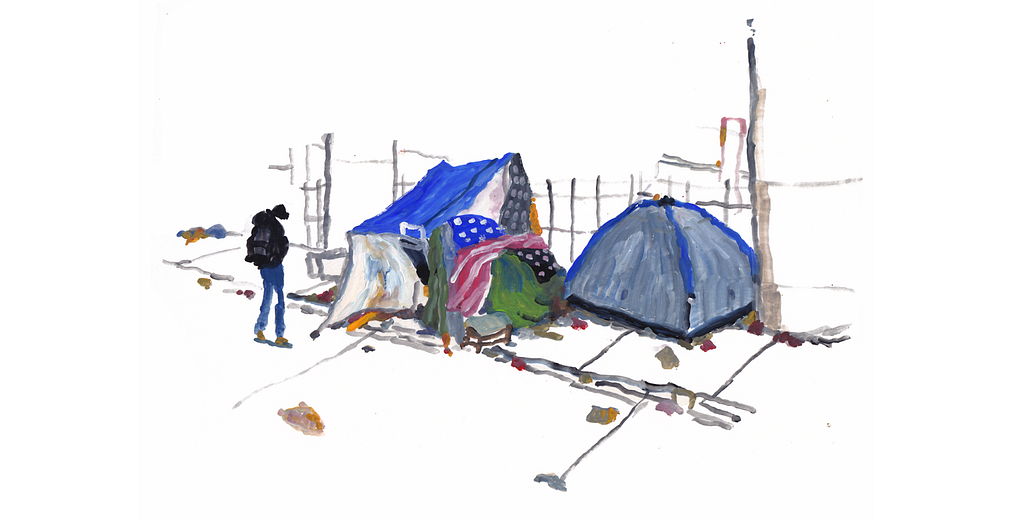
And that’s what me and my sister did. We moved up north. We bought eight acres for $8,000. A thousand dollars an acre in the woods. We bought a big old mobile home. Then my sister died…and I left. I met a woman, and another woman, and I ended up here in ’96. And that’s my story. Been out here for almost thirty years.”

I stood in line outside of the food bank. Along a wall, in a long line of people. Some of them had little carts for carrying their food home. Others were leaning against the wall. There were some old people and some young. On the ground, there was a broken helicopter toy.

People were let into the food bank two at a time. When you got in, you went to a computer and a woman took your ID (If you had one) and wrote down how many people you were. Some people brought a friend, because then they would be two people, and get more food. You were given a card that listed the number of items you could take from each shelf.

There were rows and rows of donated foods. It was an odd mix of things. Lots of canned foods, but also flowers and day-old cupcakes. One woman had a lengthy discussion with the volunteer about vegan cheese substitutes, and acted overly excited about the soft, old vegetables.


There was a lady in a red coat standing in front of the Amazon headquarters. She was being completely ignored by everyone. She was standing by a stand full of books. Inside the books, there were paintings of people in a green field with lions and birds and other animals. The book was about God’s kingdom on earth, and what it will be like. I asked her what it said in her book about homeless people.
After God’s kingdom comes, she said, there wouldn’t be any more problems. She said that we would be able to grow our own food. We’d be able to build our own houses. It said so right there in the Lord’s Prayer. “On earth as it is in heaven.” There were pictures in the book that showed this. “There will be peace between humans and animals,” it said. She paused, and looked down at her Bible for a moment.
“You know,” she said. “I used to be homeless. I was in a shelter for a year after I came out here from Atlanta.”

Look! The tent of God is with mankind, and he will reside with them, and they will be his people. And God himself will be with them.
And he will wipe out every tear from their eyes, and death will be no more, neither will mourning nor outcry nor pain be anymore. The former things have passed away. — Revelation 21:3-4

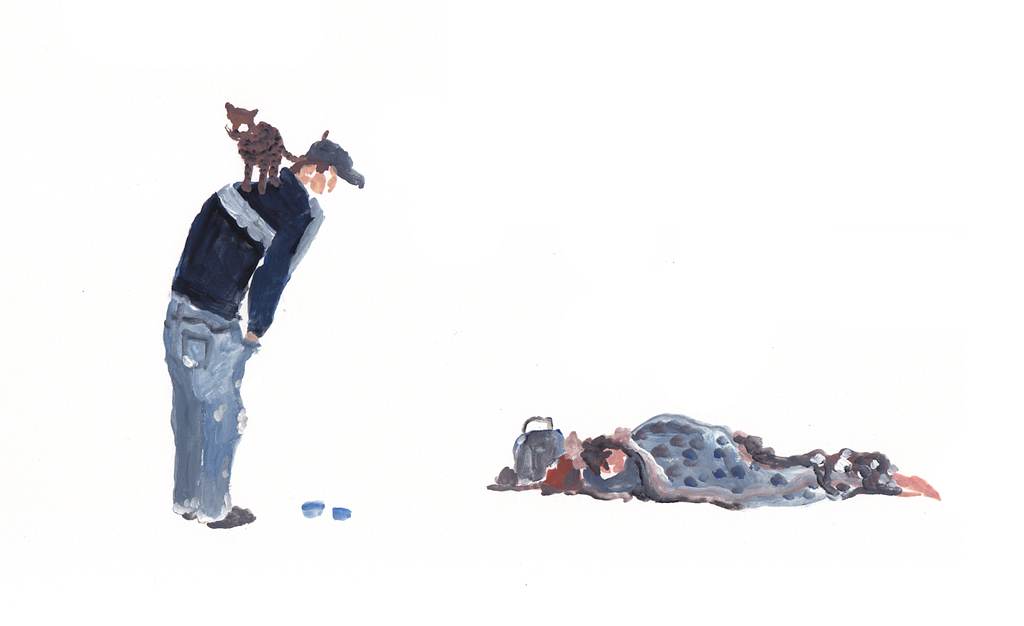
I walked all over Seattle. I met a man who balanced on a ball for a living. I met a man who balanced a cat on his back for a living. I saw a lot of people who it was impossible to meet because they were on their cell phones. I overheard conversations about how no one has conversations anymore. I watched people walk right past people on the street who were clearly disturbed, to the point of being helpless, and do nothing. So who was really crazy?
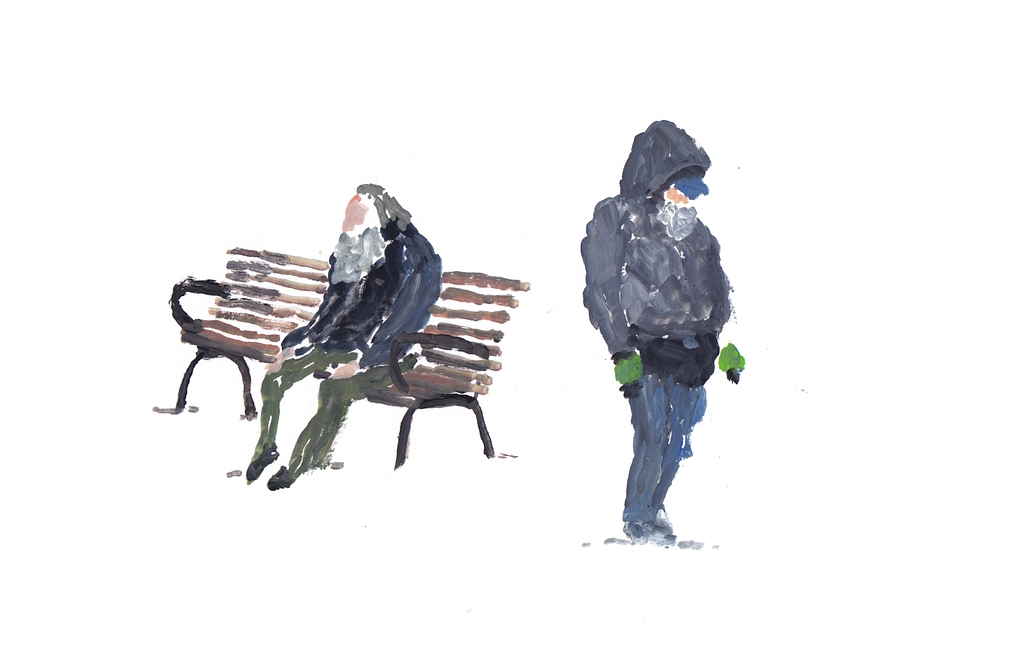
There is a place in Seattle called Pioneer Square — it’s a tourist spot with a big totem pole. When I was a kid, my mom would always warn me about the “derelicts” and say “don’t make eye contact. Seattle is the child-abduction capital of the United States.” I went there and sat down and watched the pigeons flying. There was a man with long hair talking to the sky. He had a long conversation with it, and I wondered what he was saying, and if he was getting answers. There was another man in a parka who walked a few paces and then flung his arm up and down. Then he turned around, walked a few more paces, and then did it again. Over and over, like a Swiss clock.
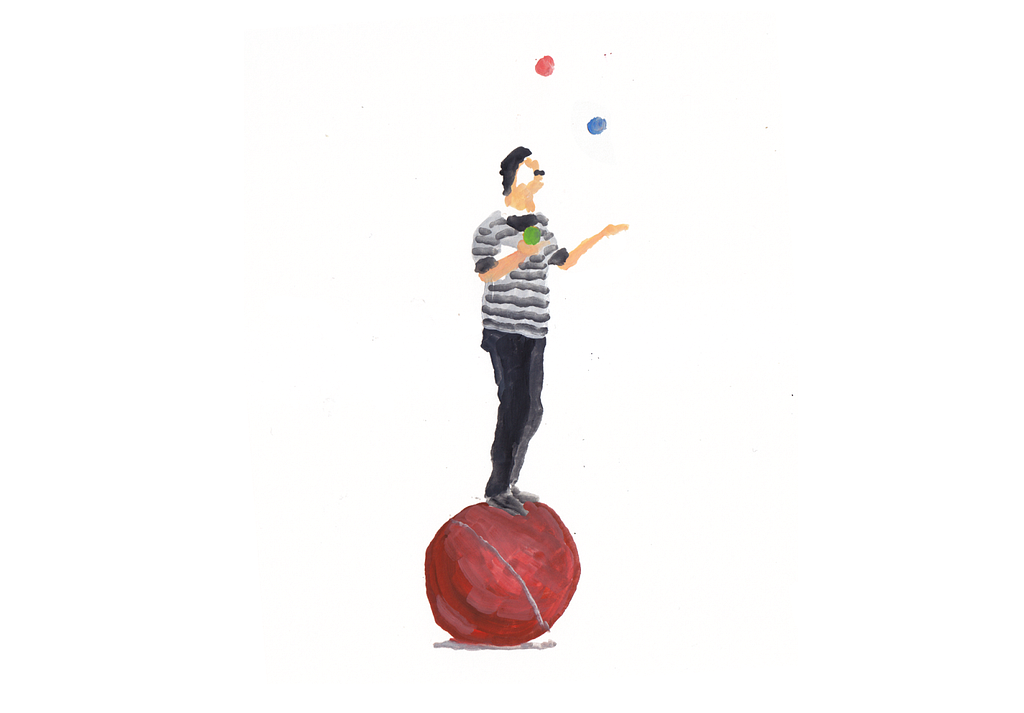
I walked to a homeless camp near an underpass of I-5. The camp was built on an artificial hill made of construction debris. It was a jumble of tents, and incredibly steep and slippery. Midway up the hill, there was a fire pit. When I arrived, the residents had learned only hours before that they were going to be evicted. Two weeks later, the camp was destroyed.

People gathered around the fire pit. Someone spilled rolling tobacco into the mud. The ground was spongy and wet. It was windy, as the hill was quite exposed. There were broken televisions, bikes, and other scavenged things.
There was a man sitting quietly, removed from the discussion. He was drawing with color pastels in a small pad. His drawings were beautiful. When I asked to look, he showed them to me, but he was tense. He seemed half appreciative that someone was asking to see his drawings, and half anxious, as if certain secrets were being revealed. Some pages had a lot of hand written notes, but I was not able to look at these. While showing others, he would either briefly explain the theme or inspiration, or he wouldn’t.
On his hands, he had a pattern drawn, though I couldn’t tell if it was a tattoo, or if it was marker.
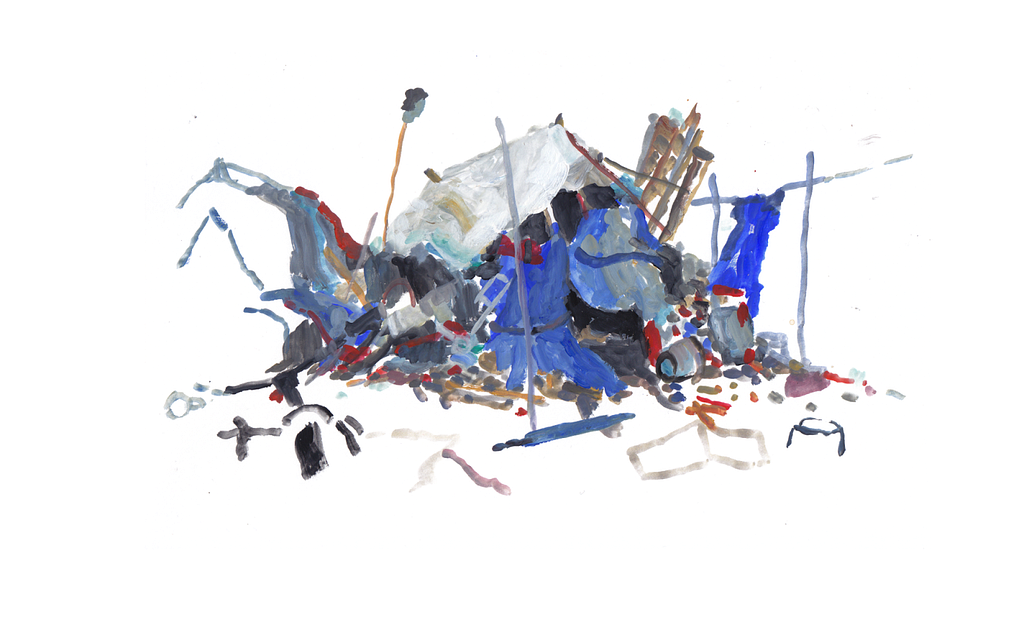
I went around looking at the different tents, and met Celine coming back into the camp. She was 30 years old, and had been homeless since she was a little girl.
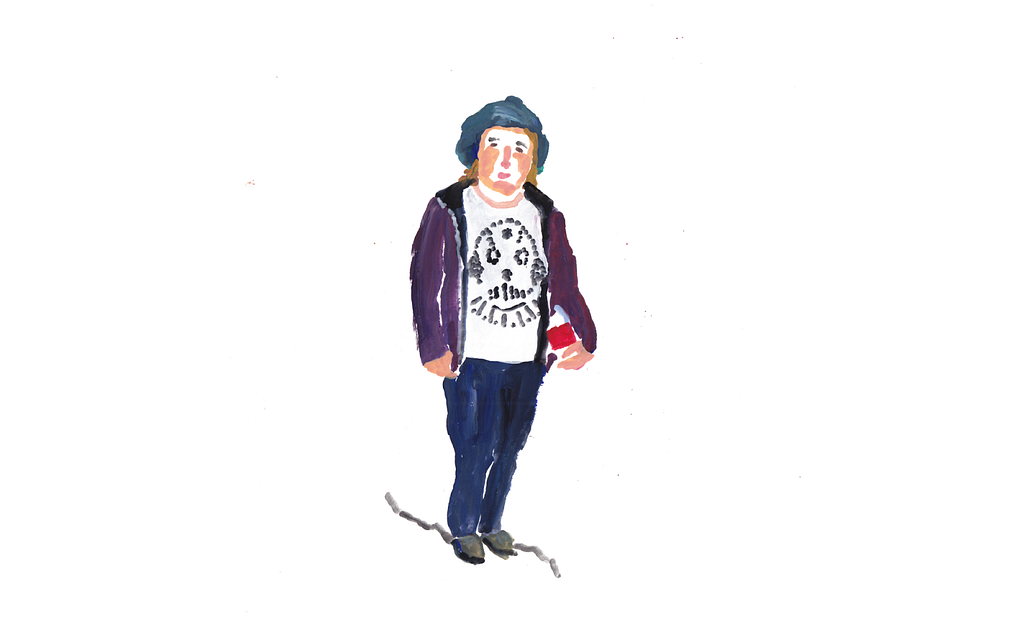
“Everybody’s so fond of labels. Well, yeah. We’re criminals. We’re trespassing. We’re criminals. Some people do drugs. Some people do all kinds of stuff. But research has been done that shows it’s more of a symptom than a problem in itself. It’s a symptom of stuff that’s going on in their head and their lives that’s untreated and undealt with. And people don’t really get a chance to do that without getting shoved into a corner, where, you know, if you want the help then you’re one of those people. Because you are homeless, or you’re poor, or you’re whatever. You’re one of those people. so you’re automatically shoved into that category. But who’s the real criminal? I’m from California. My state is going dry and, look at Nestlé — All the bottled water we get comes from California! It’s really easy to look at people who don’t have as much as you, see people in more of a survivalistic life. It does seem more animal. I think it makes people uncomfortable because it reminds them that they’re animals, and that the only thing separating them from them, is two paychecks and four walls. That’s the only difference. They might have better drugs in their medicine cabinet than they have across the street. They’re certainly a lot better medicated.”
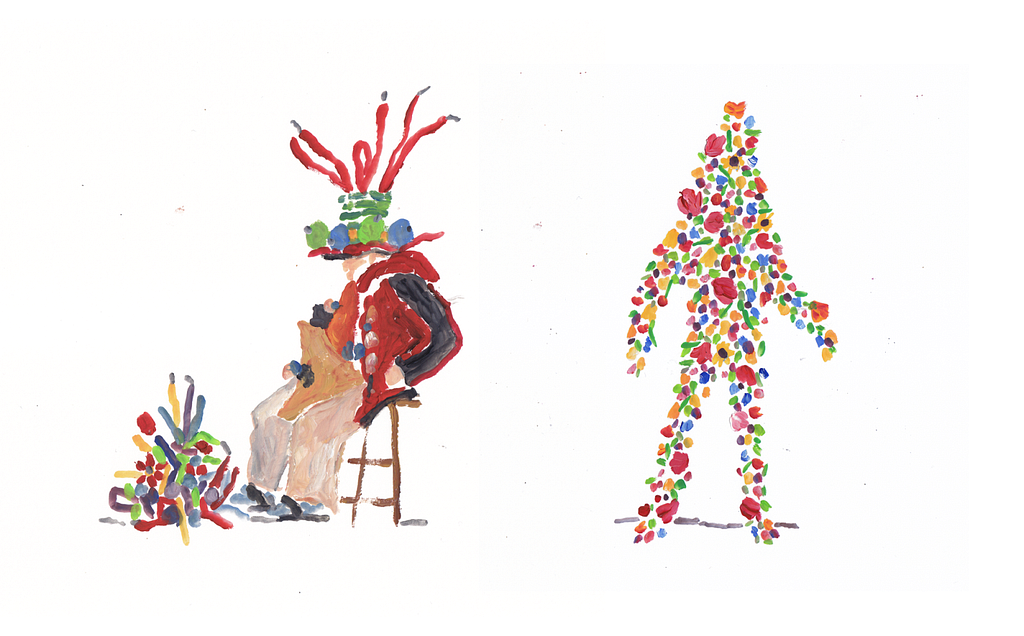

Ellie was probably in her mid-forties, dressed like a soccer mom. When I first met her, it took me a long time to realize she was homeless.

“I was living in Michigan. I’m a registered nurse. I had my three 12’s a week, I had a car. I had a place to live. I had a money. I had a Gucci bag, or maybe five. I had everything goin’ on. I was born in California, but I was only there until first grade. My mother was a Marine colonel. My dad was an insurance man. My mom was the boss, she ran the house. They died early, both from cancer. So I’ve been out here. I don’t have any brothers or sisters, don’t have any children.”
“You know what?” she said. “I’m gonna be honest with you. This lifestyle is a little addicting. I traveled around after college, did a bunch of stuff. I went to Europe, did all that kind of stuff. And then I was in a relationship in Michigan, and all of a sudden it just fell apart.”
She’s been homeless for about a year and a half. She now lives in a tent city.

“I used to live in a shelter,” she said. “When you go in at 8:30 at night you’re exhausted because you’ve been out there all day, and you have to go to this part of town for breakfast, and then ok: where’s lunch? You’re hungry. I’ve worn out so many pairs of shoes. Because you’re walking. All the time.”

“I had the flu, and they kicked me out of the shelter. I was vomiting all night long. They kick you out at 6, and I sneaked onto Seattle Center property and found this little crevice, and I just laid down there and curled up. I had no blanket, I had nothing. But I couldn’t stop vomiting. And that’s when I was like you know what? This is insane. I’m sick. I’m crying. I try not to look like I live in a tent. That’s just self respect. Not that there’s anything wrong with living in a tent. You’re not gonna catch me pushing a shopping cart.
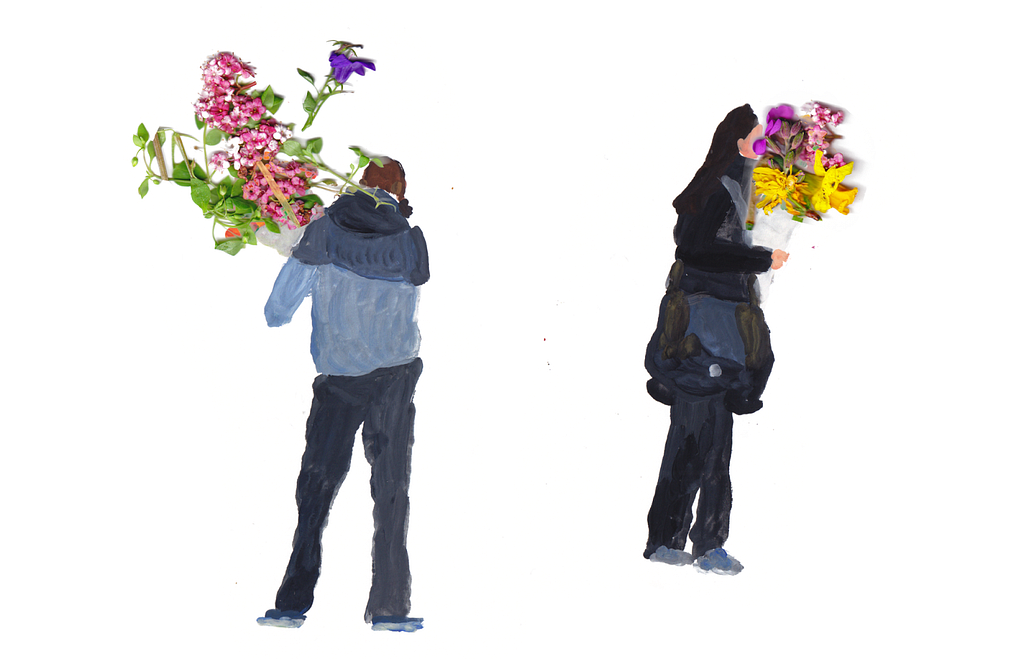
“You see those people?” she says. She pointed to an old man and a young woman on a bench. Totally ordinary looking people. “They’re homeless,” she says. “A lot of people you see on the street that look completely normal are homeless. We don’t all call attention to it.”
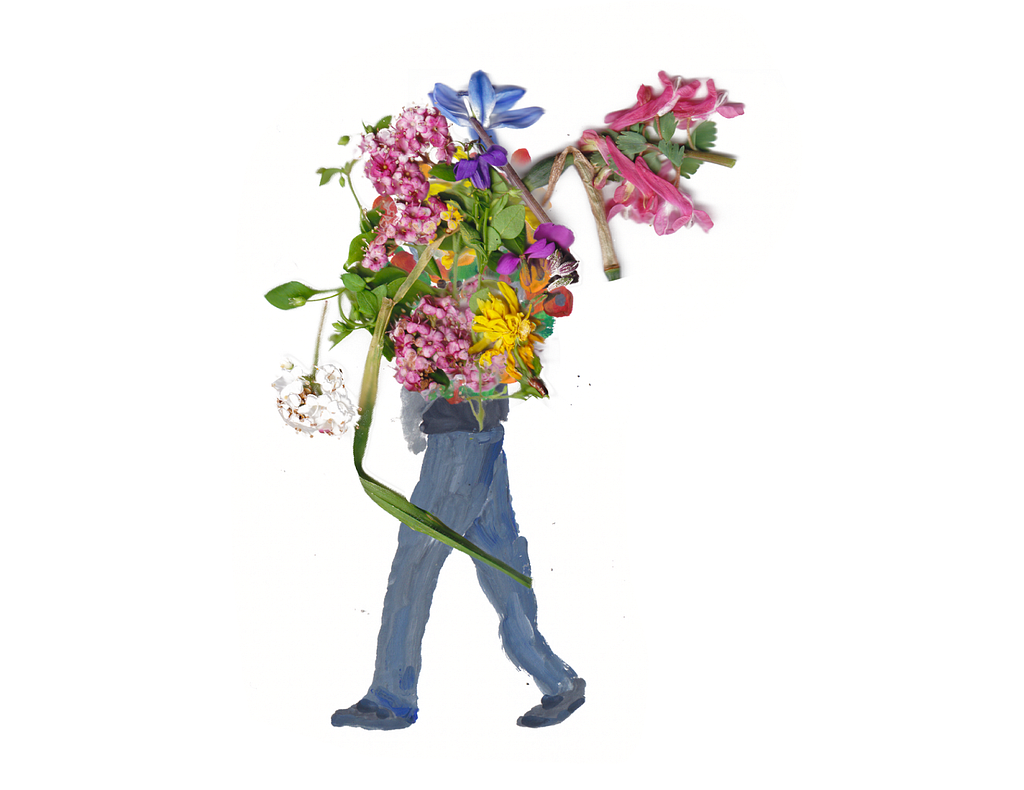
“Do I still have my two black eyes?” she asked. “A drunk guy down over here. I was walking and he was lying on the sidewalk. He reached out and grabbed my ankle. I went down and I bit the concrete. I was a mess. Two black eyes big red nose. I ended up at the ER because I had a headache that wouldn’t go away. Concussion. I’m feeling okay now, except that it’s Valentine’s day.
“Sometimes you just meet the most amazing people, and sometimes you meet some assholes. I was raped out here a year and half ago.” She said the guy held her down under a trailer. They caught him. He got one year.
I asked her what she thought her future will be like. If she would stay homeless.

“I don’t know. I’m sometimes scared because I don’t know. I’m sometimes relieved because I don’t know. I don’t know. I’ve met some amazing people out here. I’ve seen some incredible things. The street is mine some mornings, early, before anyone else is awake. It’s freedom. It’s beautiful sometimes and…”

“I just know. The only thing..oh God I’m gonna cry,” she pauses, touches her eye. “The only thing I really want… it’s not material things, because I’ve had all that. I just want to find — ,” the wind blew. I couldn’t hear her.
“Sorry,” I said. “What?”
“Love.”

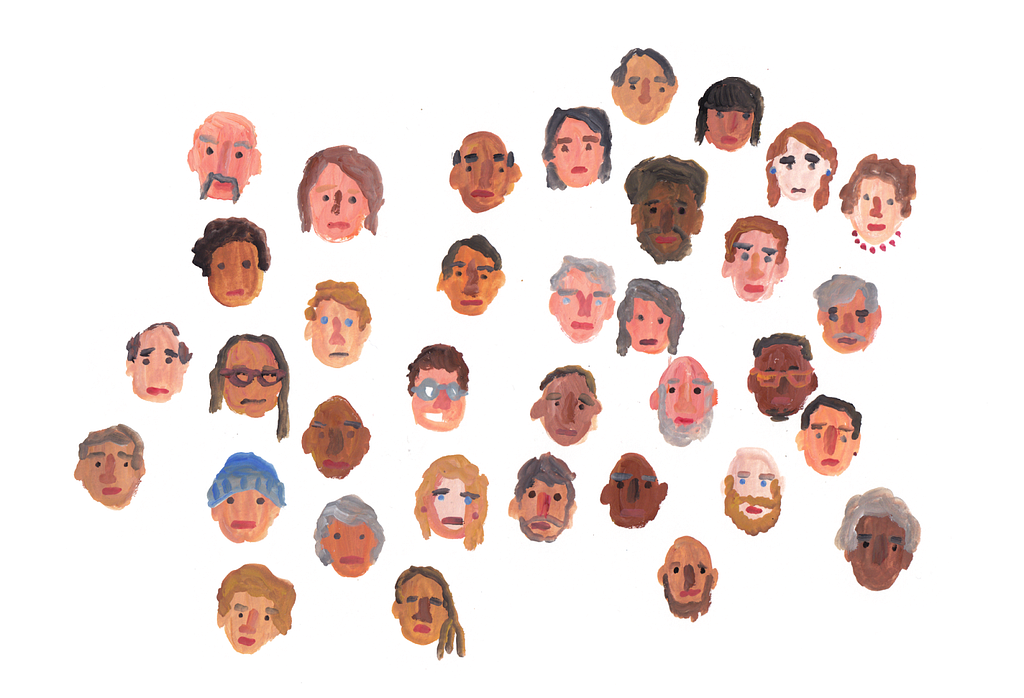
All across Seattle, neighborhoods were changing. Big companies were moving in, bringing highly paid workers, and people who used to live in some of the less expensive neighborhoods like around Capitol Hill and Ballard couldn’t afford to anymore. When I spoke to the homeless people, though, it was never a big trend that put them on the street, it was something small, or a collection of small things that finally did it. Maybe they said the wrong thing in a relationship, they had one too many fights, and it ended, and they got kicked out. Maybe they got sick, and lost a job, and couldn’t afford medication, or became addicted to it. It was never an earthquake that did it. It was a slight gust of wind.
Once a life is broken, it is difficult to put it back together again. Keeping a phone turned on, getting regular showers, and finding a place to rest so that you can do well in a job interview turn into your full time job.
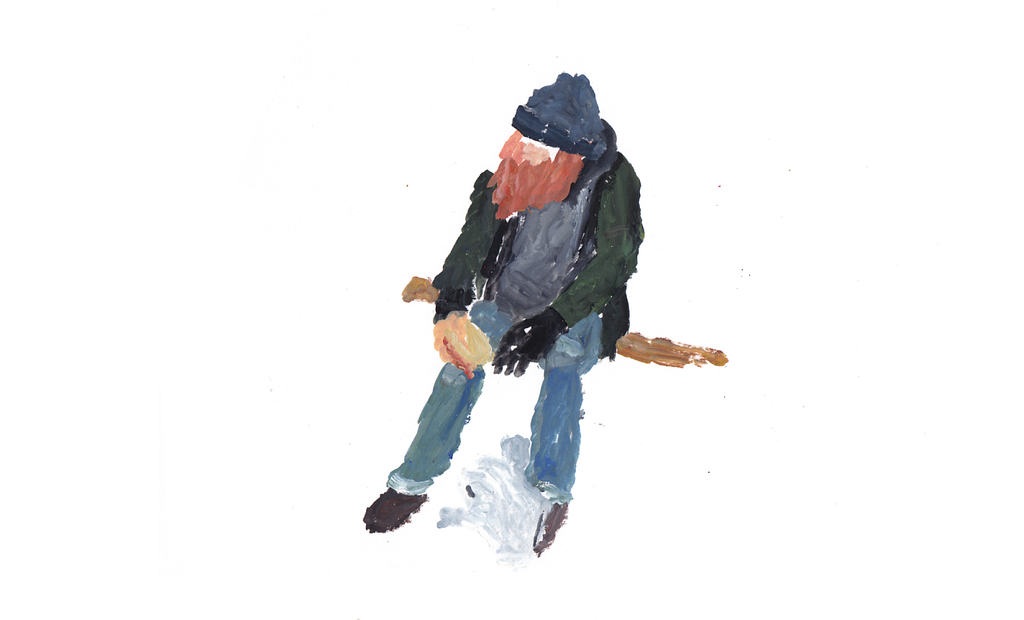
When I first met Red Beard, I was standing next to him, and we were watching a boy swaying back and forth, ready to fall into traffic. Red Beard was shouting to the boy, telling him to come over, and he would help him, because the boy was going to fall. No one but Red Beard offered any help to this boy, or even noticed him. Red Beard had a cut on his face; he said he was punched for looking at someone wrong. He had a hand all wrapped up in a bandage, an abscessed tooth and a bad foot from when he worked on boats, somewhere out on the Bering Sea. If a foot stays wet and cold for too long, he said, it becomes useless. “Stupid asshole,” he muttered, about the boy. He shook his head. “It’s heroin,” he said.
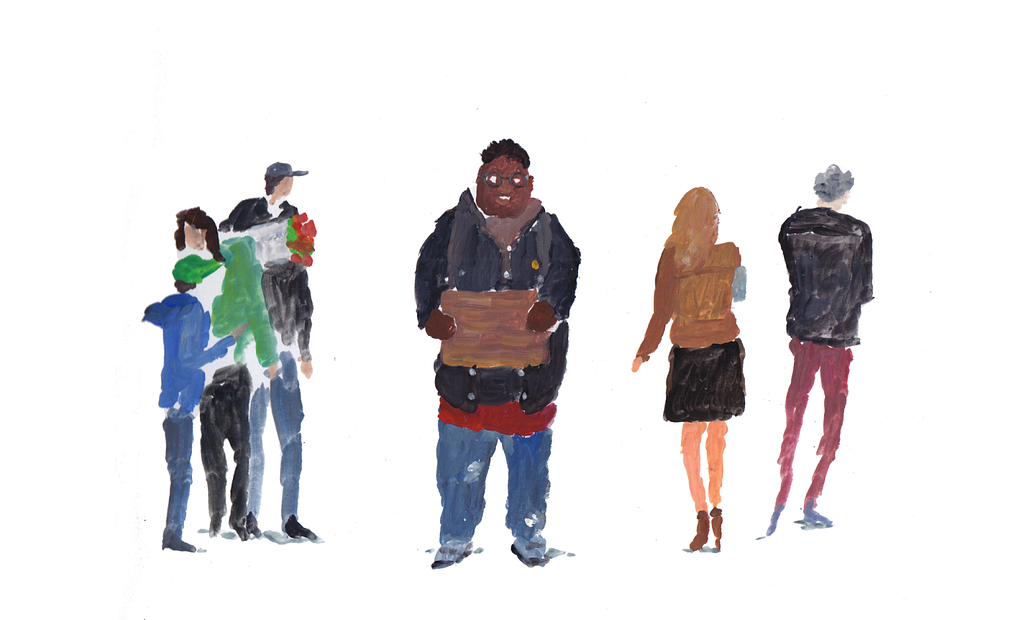
This is a poet. He never knew his father, but decided to go looking for him. This was the idea that doomed him. When he got to his father’s house, his father shut the door in his face. The poet was trying to get money to turn his phone back on, so that he could fill out job applications. One of his poems included the phrase “concrete as bed sheets.”
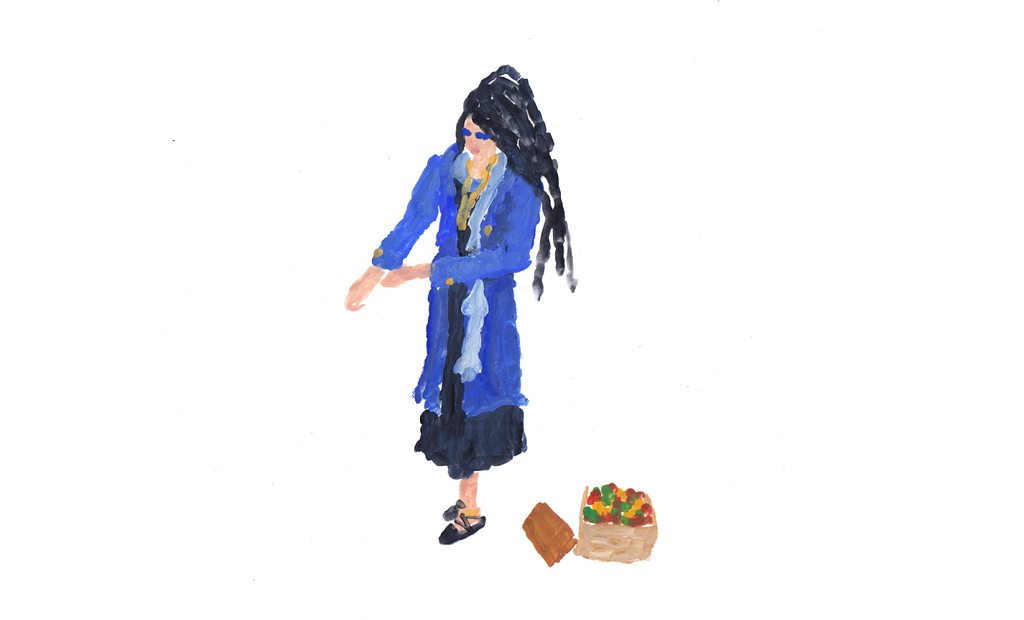
When I first met this woman she was standing in the rain and said she desperately needed water. On rainy days, she said, it got a little bit slow. People were not as willing to reach into the purse or pocket for a one dollar bill. She spent about five hours a day out there in the rain with her sign, which she covered in plastic, so it didn’t get wet. Sometimes she tried to get money. Other days food, or water.
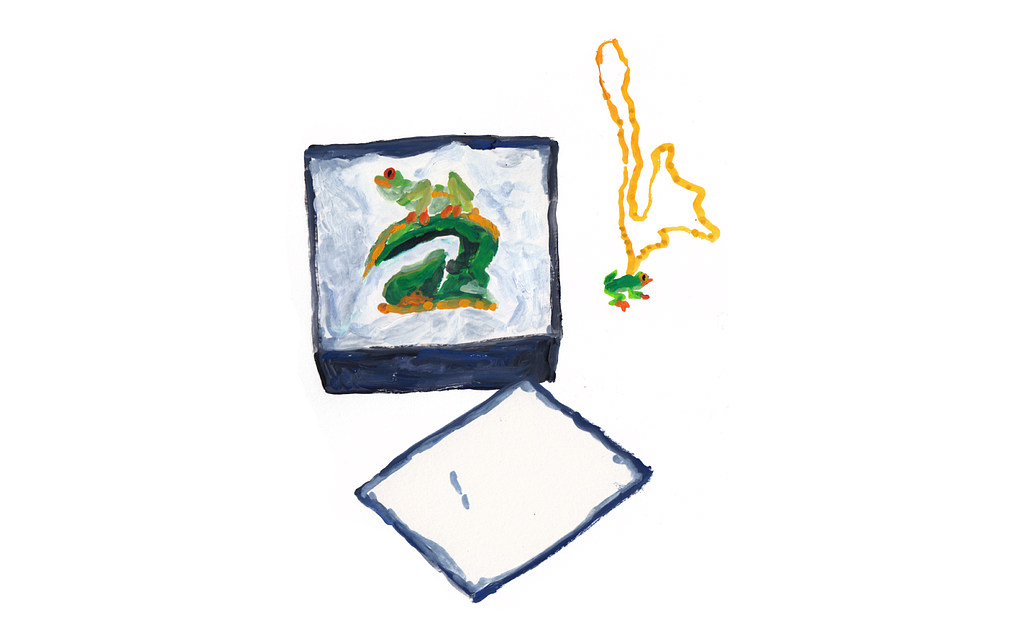
One lady agreed to show me her most prized possession. It had been a Christmas gift, and she stored it in her tent in a black plastic bag. Inside the bag was a small box, like a jewelry box. She opened it up and there was a small white cushion, on top of which was a shiny porcelain frog. “It opens up,” she said.
She told me that her youngest son was a crazy man. He was dangerous. She gave him up for adoption, because she had him when she was sixteen. She kept trying to meet up with him, but it didn’t work, and when she did, he was dangerous. Violent. He’d been in foster care his whole life, because she had to give him up.
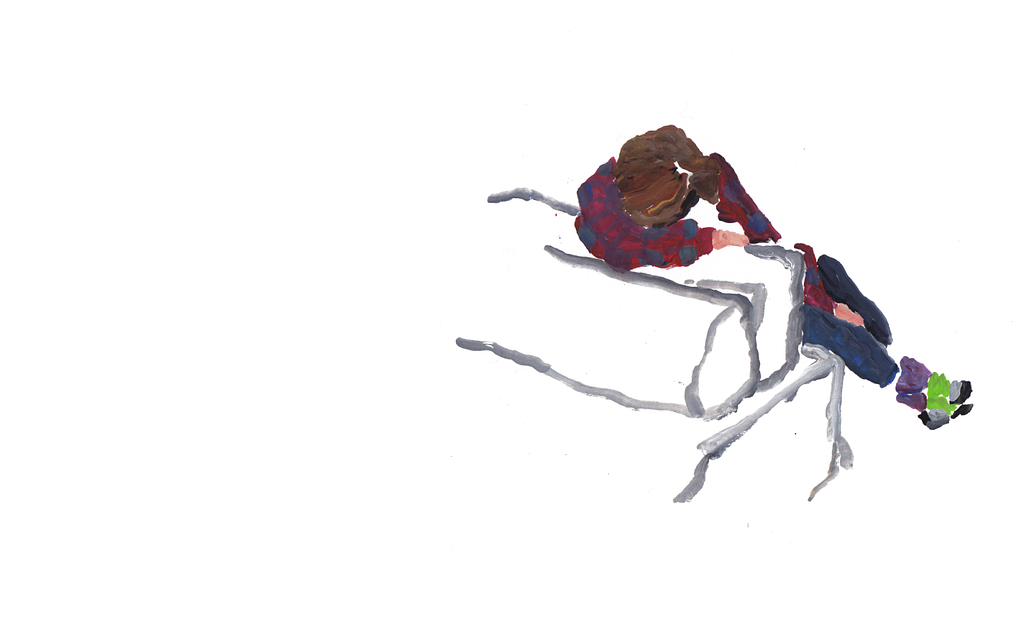
“See?” She held up a little frog necklace that lived inside the big frog. The small frog was a copy of the big one, hanging from a fragile gold chain

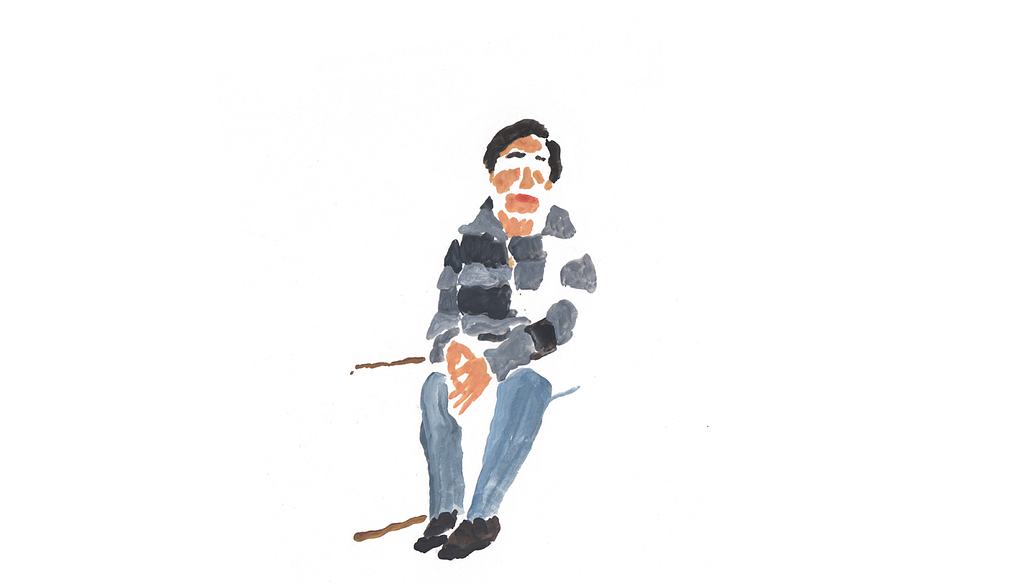
“Iwas walking home from work once with my backpack and someone shouted at me, ‘GET A JOB!’” Jay said. “I had a job. I just didn’t have a home. I lived with my partner for 17 years. We made a lot of money, so I lived very, very comfortably. That was until three years ago, when that relationship ended, and I decided to be ‘free.’ Of course, I didn’t really expect that to mean I would lose my apartment, my car, my job. Everything can come and go. You know, it’s a crazy world out here. I wasn’t ready for it I guess.
When I met my new partner, I knew he was homeless. I said, ‘Poor thing.’ He said, ‘I’m not poor, I’m free.’ He said, ‘You need to come and live with me,’ which was under a parking lot in lower Queen Anne. He made me take off my shoes when I went in there. I remember there was a Starbucks near there and we would go in there and the girl behind the counter was kind of tense. After three or four days, we started being dirty. Our hair got ratty. She didn’t even respond to us when we said hello. People moved away from us. I remember walking down the street with him that day, with our big backpacks, and thinking, ‘Everyone’s trying to ignore us. We’re invisible.’”

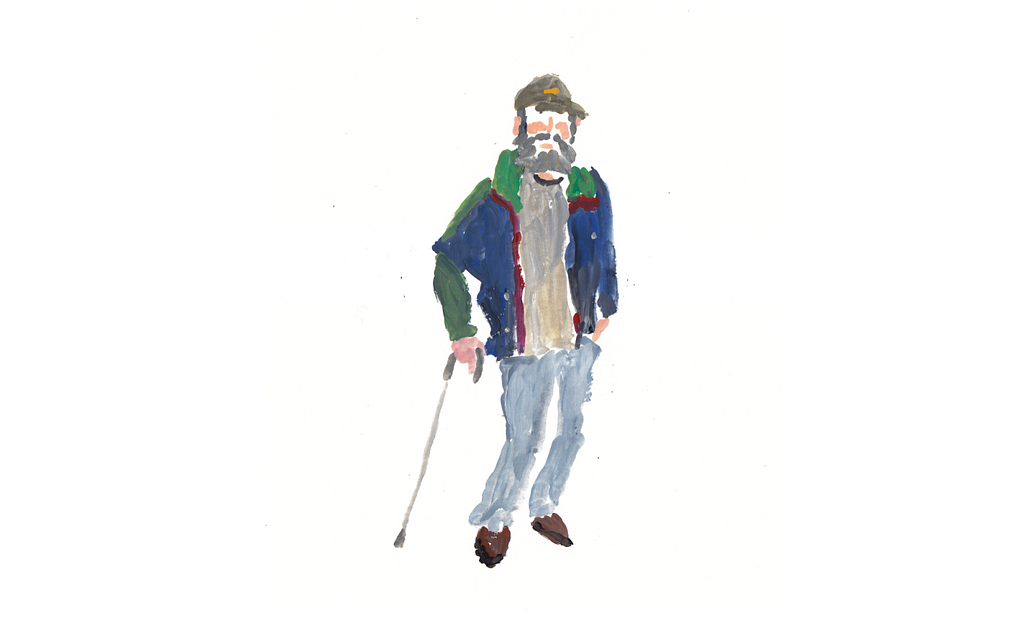
“Iused to work in the carnival,” Gary said. He had a bad limp. “Until I got shot.”
“Got lucky,” he said. “The guy had a .357 magnum. But the guy who shot me had been at the range that morning, used up all his .357 ammo. So I got shot with a .22. They had me on the table, all naked, all cut up, and I told them, ‘Take that sock off me,’ and they said, ‘there’s no sock on you.’ Haven’t been able to walk right since.”
“Anyway,” he said. “Worked for the carnival for a while. A ride called the Electric Slide.” He’d been to all fifty states, hitchhiking mostly. He was also a Vietnam veteran. “It’s no good anymore,” he said. “Used to be you could hitchhike where-ever you wanted to go. Now, everyone’s doin’ this,” He looked down at his hands, and mimicked typing on a phone. “I’m crazy,” he said, “But that’s crazy.” He laughed. “Nah. I’m just waitin for the Lord to take me to be honest with you,” he said.
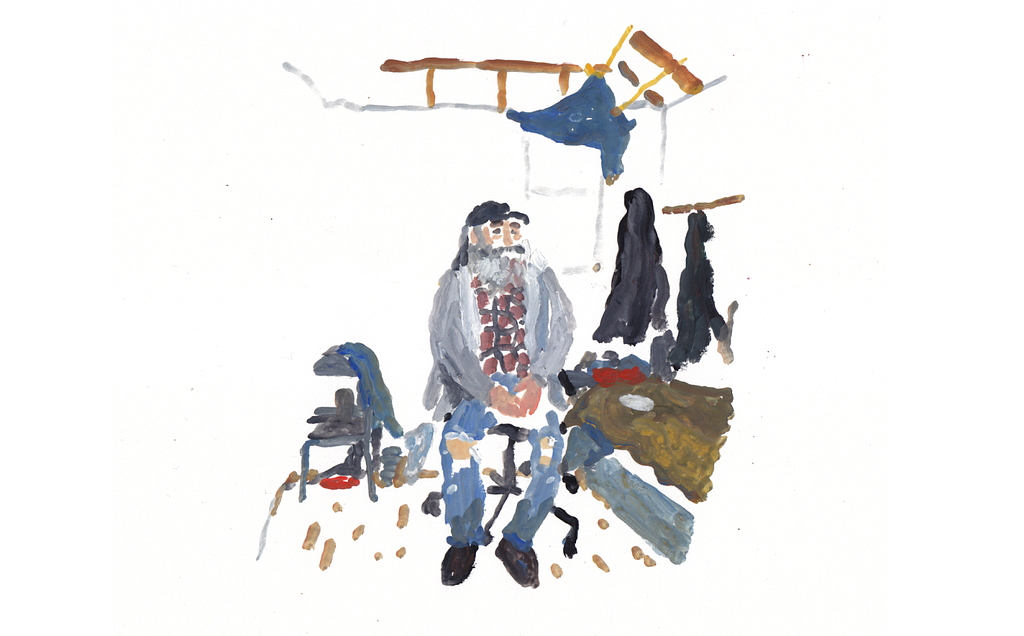
Nearby, in the tent city was a man called John. He worked for forty years, on boats, in shops, on lines. His hands were calloused. He didn’t stand much. Like Gary, he couldn’t really walk anymore. “Built my own bed,” he said. He leaned and pointed to it. It was a box and a mattress. I didn’t know it wasn’t a proper bed. “It’s made out of a life raft someone threw out,” he said. “They said it was garbage, but I used to work with those so I just worked it a bit and it’s a real bed now.”
“Worked my whole life, didn’t ask for anything,” he said. “Trying to get benefits now, but I absolutely hate it. Good with this and these,” he said, pointing to his head and his hands. “No good with forms and offices.”
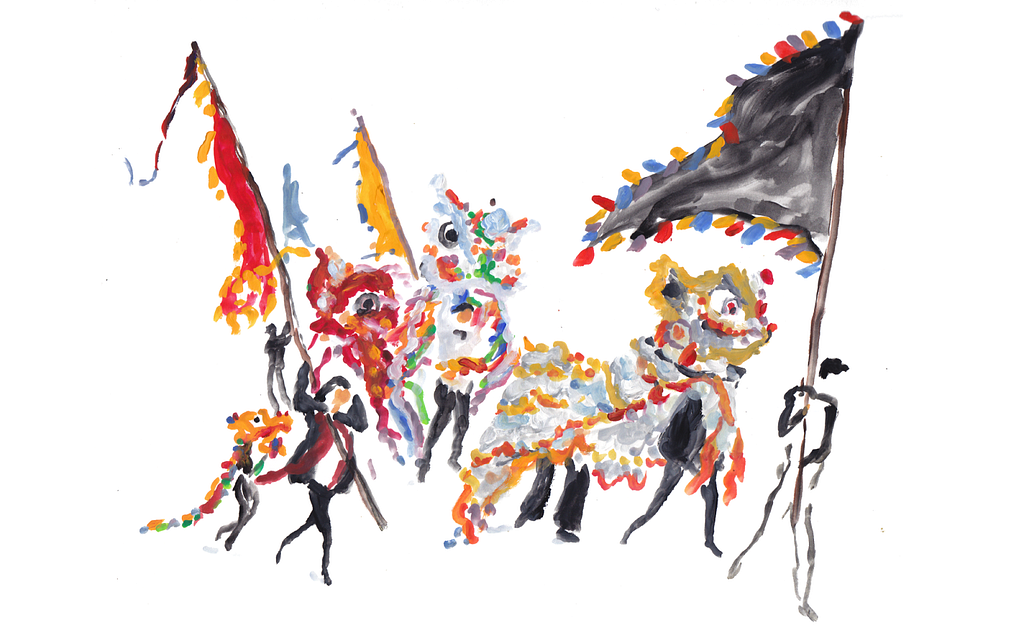
South of the International District, there was an extensive hidden encampment called the Jungle. “Full of killing and murders and stabbings and mother rapers,” one man told me. “Father-rapers and mother-stabbers!” I went close, but not too close, and ended up encountering a Chinese New Year parade with dragons and drums. Underneath an overpass, three homeless men came out of tents and danced wildly to the drum music, gesturing and dancing around.

Other people walked by as if they didn’t see the dragons, as if they didn’t hear the drums, and two days later, the city sent police and machines to bulldoze the tents where the dancing men lived.
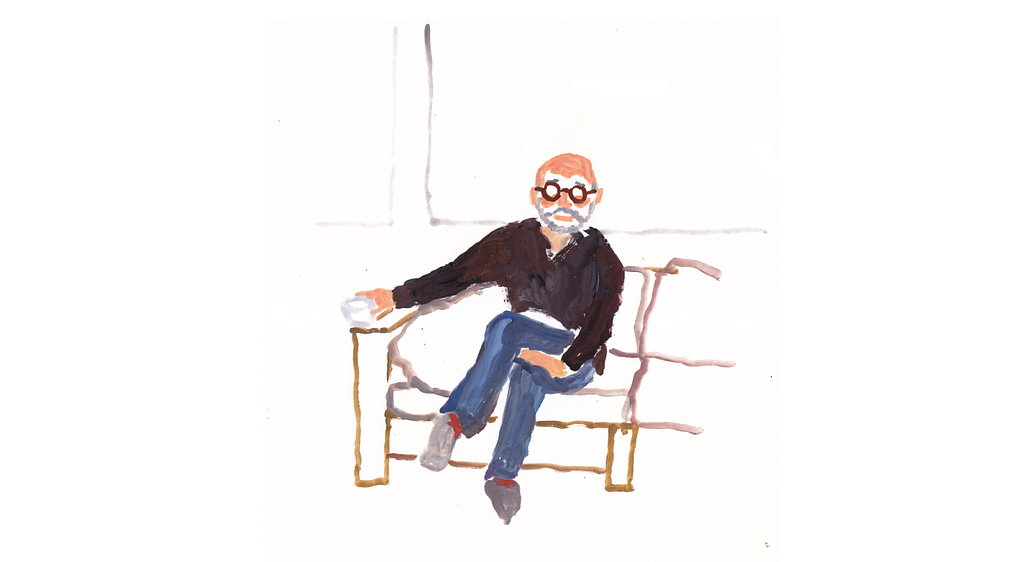
Ispoke to a religion professor, and I asked him to explain to me why there were so many homeless people. He said it was a result of the system (he was a communist). He said that the system was there to make us consume and produce. The system seemed wonderful. It produced so many things. It was so fantastic that it had produced machines that made us obsolete, so there were no jobs anymore. It was unsatisfied with the extra people with no jobs, and so it was making ways to hide them. In tent cities, in jails, in cracks in the street. These were extra people. Surplus population, he said. They were useless to the system.
He taught philosophy in a women’s prison. Some of the people he educated will never be free again. Seventy percent, he said, report that they were sexually abused before they even reached prison. They belonged in hospitals, he said, not in prison.
There will only be more homeless people in the future, the professor said. More and more people will find themselves unable or unwilling to go along with the program. They too will be surplus, and society will eventually look for a place to store them, like refugee camps, or prisons, because they will become numerous and it will become a big problem.

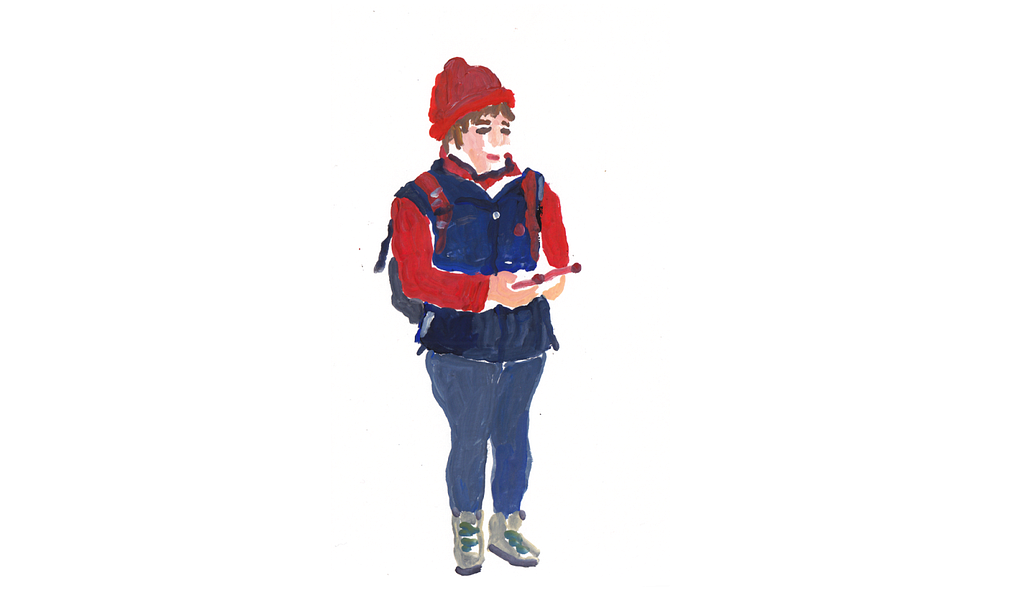
The city was full of do-gooders. I walked around Seattle for a long time. Every so often, I was bothered by someone asking for money to help the bees, or to guarantee that people could get abortions. One girl in a bright red hat stopped me, and said she was working with Doctors Without Borders. She said she had worked with them in Rwanda. The fields were so green there, she said. The dirt was so red. She asked me what I knew about Doctors Without Borders. I told her. She asked what I was doing in Seattle, and I told her I was learning about homelessness.
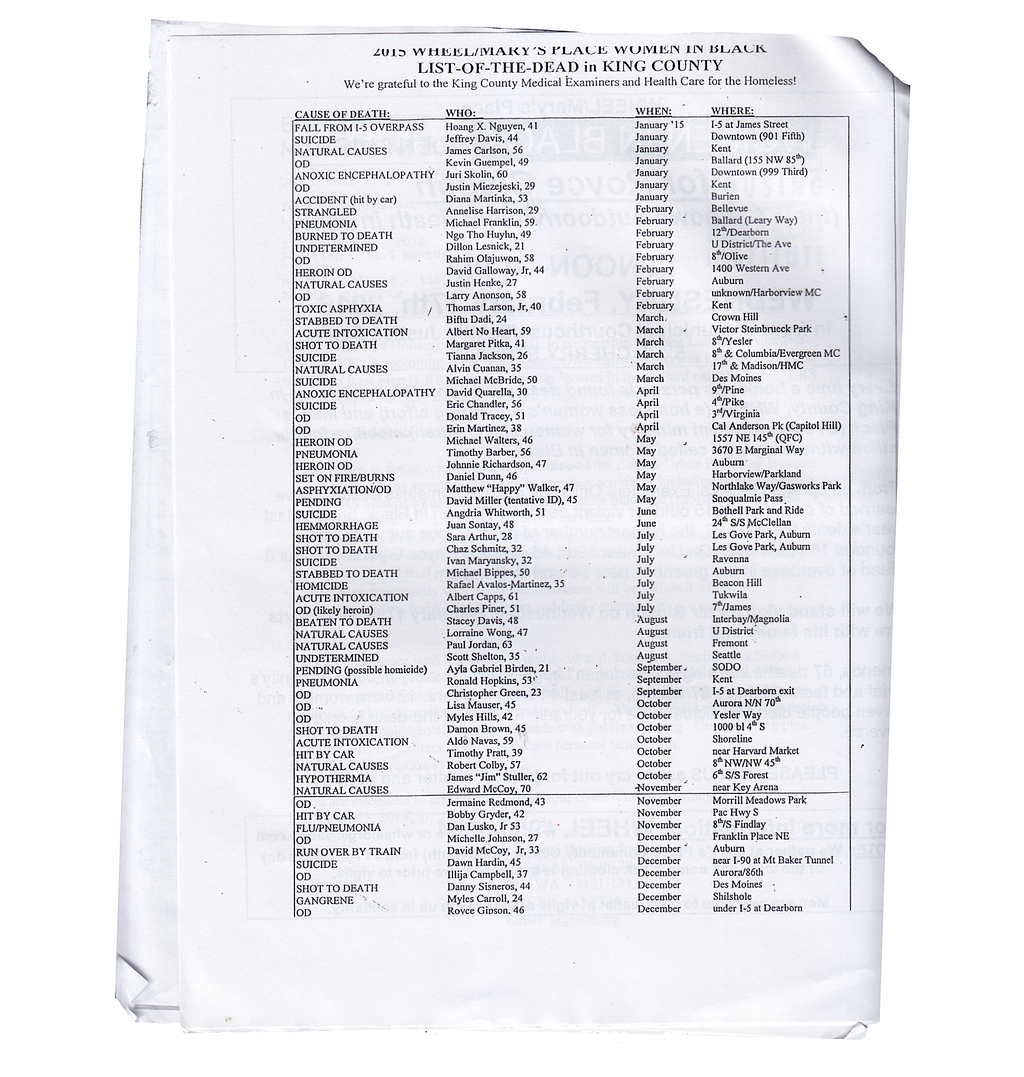
“Yeah,” she said. “It’s a big problem. But still,” she said. “We have to keep in mind that we in America have it good. We don’t have the problems that a lot of other countries have.”
I stood there, listening. Mentally ill people wandered beneath skyscrapers next to people collecting money for bees. That was a particular bit of insanity you didn’t find even in the third world. She saw the look on my face.
“I guess it’s still hard, though,” she said. “Living on the street.”
A woman walked past then, just at that second, a crazy lady, with wild hair. She shouted at us, getting close. “YEAH!” she shouted. “IT FUCKING IS.”
People become homeless because of a tiny problem that gets them at the wrong time. It is a refugee crisis in slow motion. There was no one catastrophe, but millions of quiet disasters. So far, these small problems haven’t added up in our minds. It is easy to ignore until it is your brother or your son or your friend, and then you can’t ignore it anymore.

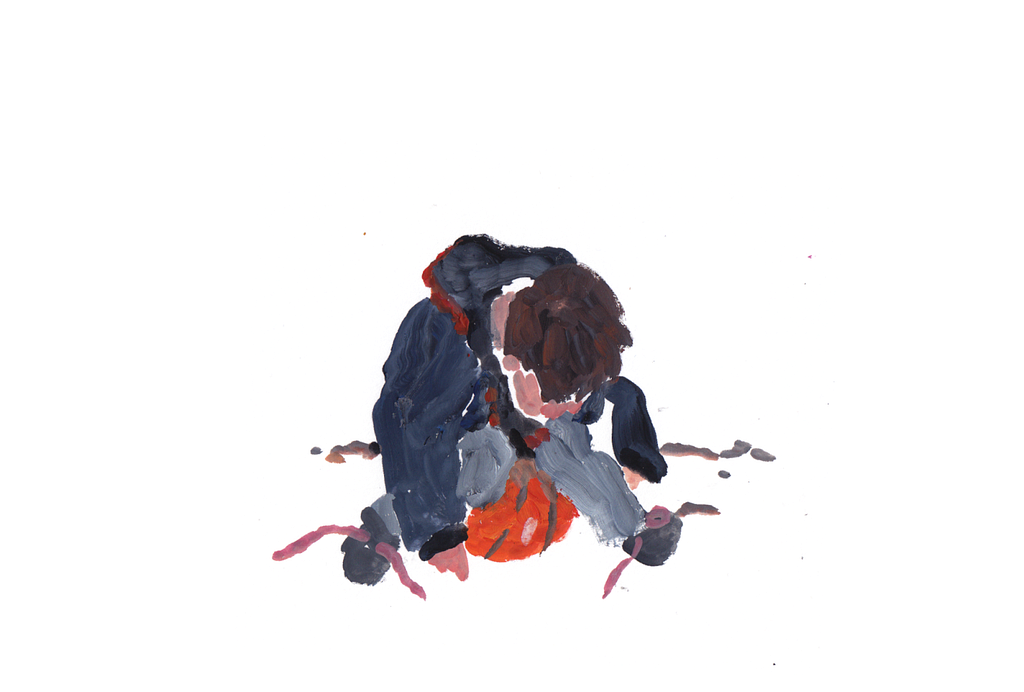
Devyn, who was six, lived with his mom and dad in a tiny house in the Ballard homeless camp. Inside the house was a mat for sleeping, and a shelf messily stuffed with clothes. On the ground, there was a Curious George book. Most of the floor of the shack was covered with a Teenage Mutant Ninja Turtles mat.
Devyn was born prematurely while his mom Des was working at McDonalds. His dad, Matt, who was a manager at Burger King at the time, couldn’t get time off, so Des took care of him on her own, even though she had an emergency C-section. I walked with him and his mom to a Christian bookstore where they gave out free coffee. He told me that when he grows up, he wants to be Noah’s Ark. “You mean Noah, right?” his mom said.
“No,” Devyn corrected her. The Ark itself. Then he grabbed my sleeve and whispered to me. “Fairy tale!”

Everyone in the tent city said how sharp Devyn was. He ran around with a garbage picker claw and called it a Terminator arm. He built rat traps. He had a blaster that sent you to a different dimension if it hit you.
“I blasted you!” he shouted, running around the tents. “Now you’re in the seventh dimensiary. Now I’m gonna zap you into the seventy-seventh dimensiary!”
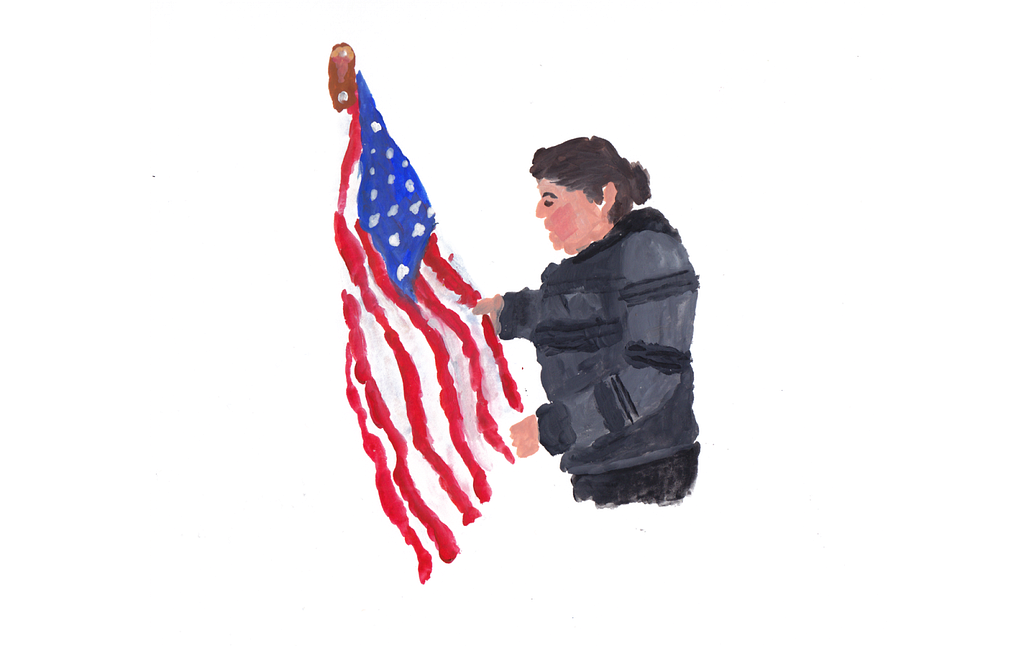
Des came from North Dakota. She was Native American. She had a tattoo with a feather, because everyone kept mistaking her for Mexican. Matt, Devyn’s father, was from Minnesota. They were both on medication. Des was afraid she was diabetic. She was too scared to go to the doctor. Her mother and grandmother were both diabetic. She said it runs in her blood.
Devyn aimed the blaster, then lowered it. He walked over to me, considering whether to blast me or not.
“I like to think about such things as dimensions,” he said. “This planet is not the only thing that has living life. Planets have aliens. Other planets do. We’re not the only planet in this solar system with living beings.”

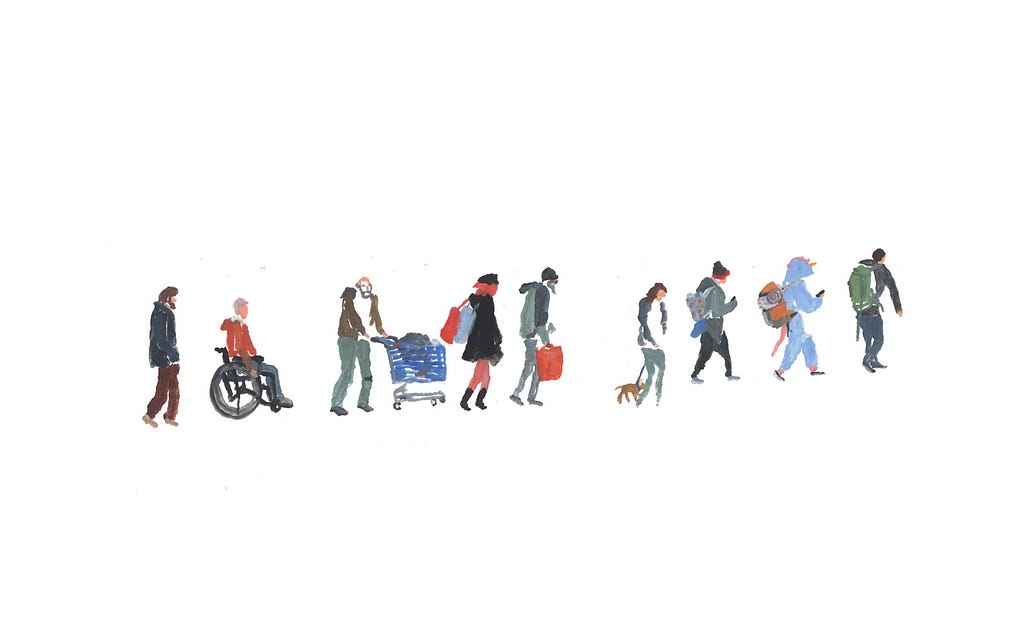
One morning in the shed in front of the Ballard homeless camp, a discussion about death started. In one of the tents, there was an old lady crying. Inside there were two chihuahuas, one living and one dead.
“It’s weird,” someone said. “She has the living one right next to his brother.”
“It died in the night, from cold or something,” someone else said.
“She’s been in there hollering all night.”
“She’s gonna carry it up to Snoqualmie and bury it next to her brother,” someone said.
“Well, how’s she gonna get up there?”
“Bus. She’s gonna carry it up in her bag, right there with her on the seat.”
There was a long pause, everyone considered this.
“They say there are seven stages of grief,” someone said.
“More like ten thousand,” said someone else.

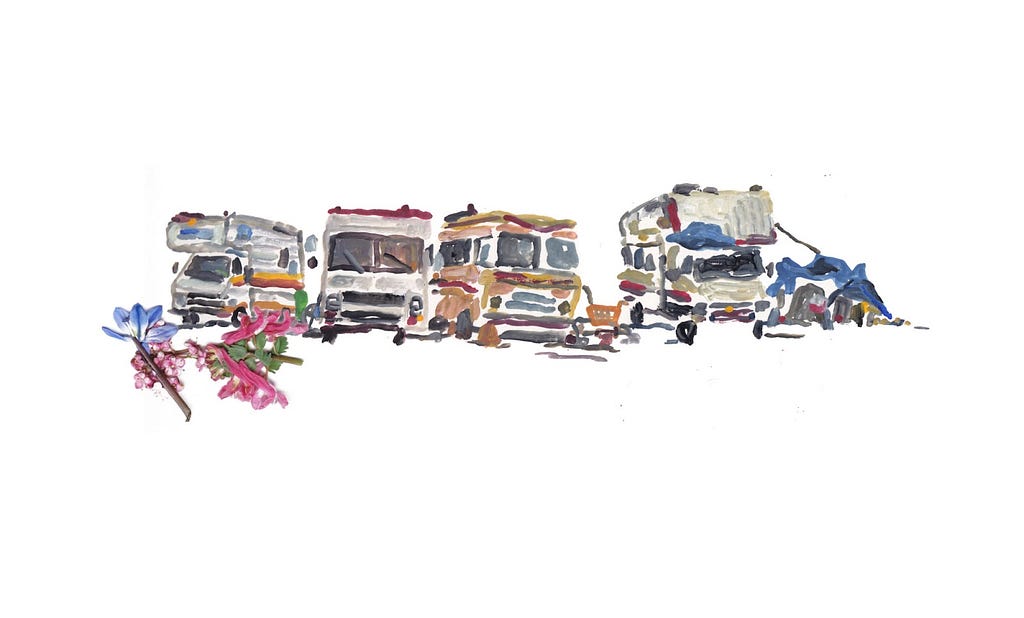

Ellie told me about a friend of hers who died, an army special forces man, who had been in Iraq. He died because he drank too much Listerine. It got his liver. Des told me about a friend of hers who died, a guy named Alaska, who was famous for going on America’s Got Talent. “He was a dancer,” Des told me. She was still very upset. He was her best friend.
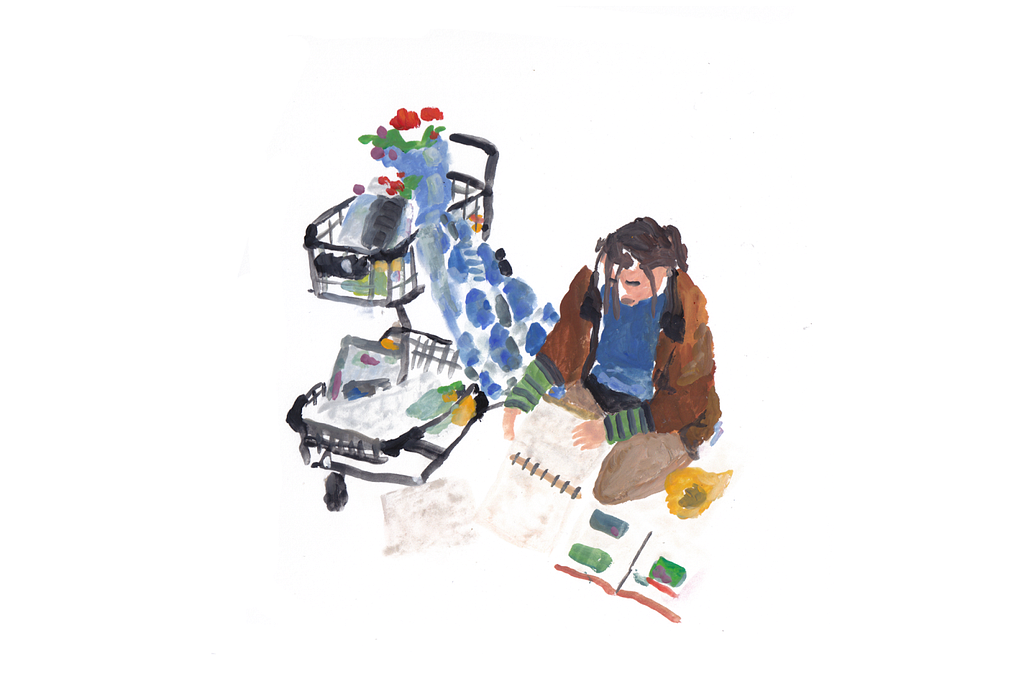
“I do people too, and waterfall scenes. It’s hard in the rain. I can do portraits, though.” The woman was drawing using an old magazine as a reference. There was an elephant picture and she was copying it onto the page using a broken mechanical pencil. I walked down the street, did a few errands, and came back.
“Hey,” she said. “Let me show you how the elephant turned out.” I bent down to look. Next to me, a man and a woman, both holding cardboard signs, started shouting.
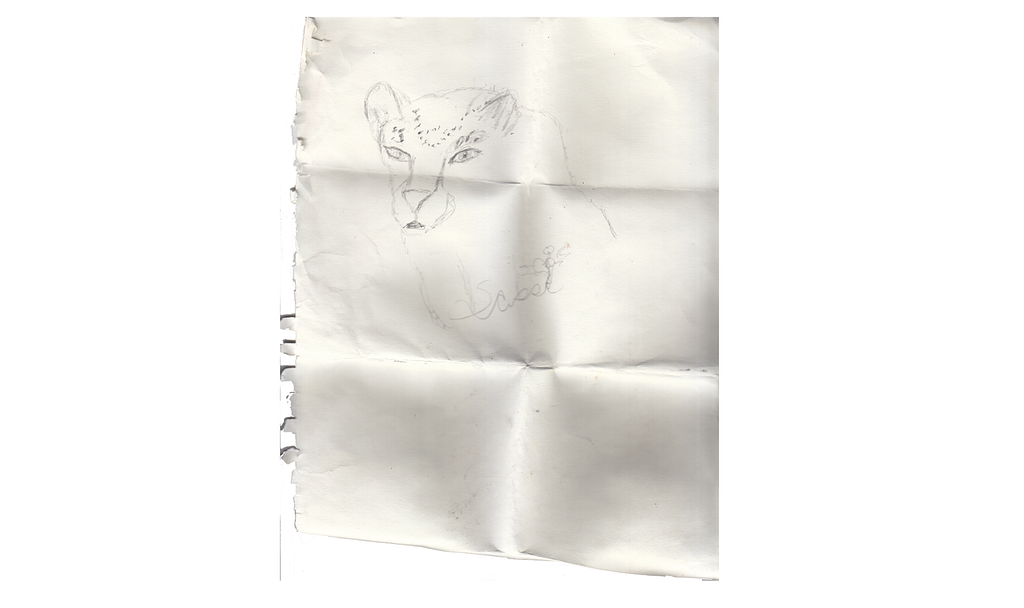
“YOU DIDN’T SEE ANYTHING!” The man shouted.
“He fucking pulled a knife on me!” the woman yelled, backing away.
The man shouted some more. He got in the face of another man. “YOU KEEP YOUR HANDS IN YOUR FUCKING POCKETS!” he shouted, then stormed off, gesturing. The drawing lady looked over, then looked down at her drawing of an elephant, which was getting wet in the rain.

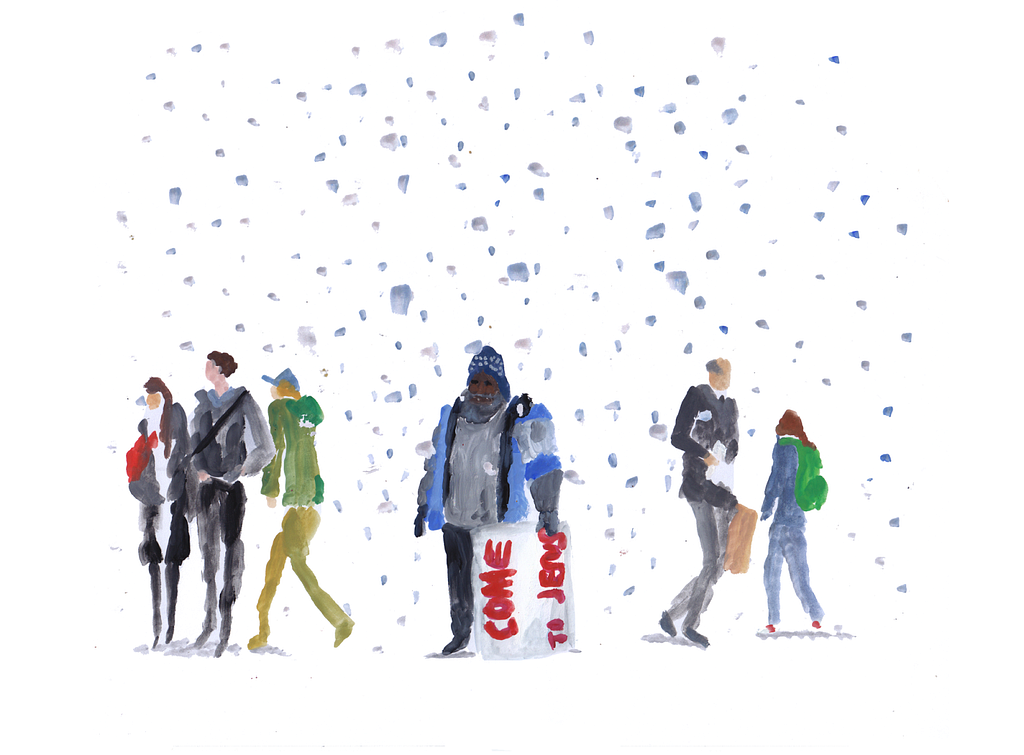
On my way to the airport, I found a man shouting on the corner, with a small crowd around him. His name was Charlie.
“…I know that it matter how you feel towards your loved ones God, and so I also pray for this young lady. I pray for better health for her. And I pray that things in her life clear up. Things that oppressin’ her to go. I pray for her credit score God. That her legal issues be resolved. I pray for her better health. I even pray God that you would clear up her skin. Because the Word say that you should beautify the meat for salvation God. Take care of her flesh. I also pray for divine order to come in her life, I pray for that day God! A day of divine increase! That you would move in the right people, but also move all the wrong people out of her life God. People that shouldn’t be in her heart shouldn’t be in her heart! Remove them God! Let only be what is ordained to be. And bless all the kids God! And cats and dogs! Amen.”
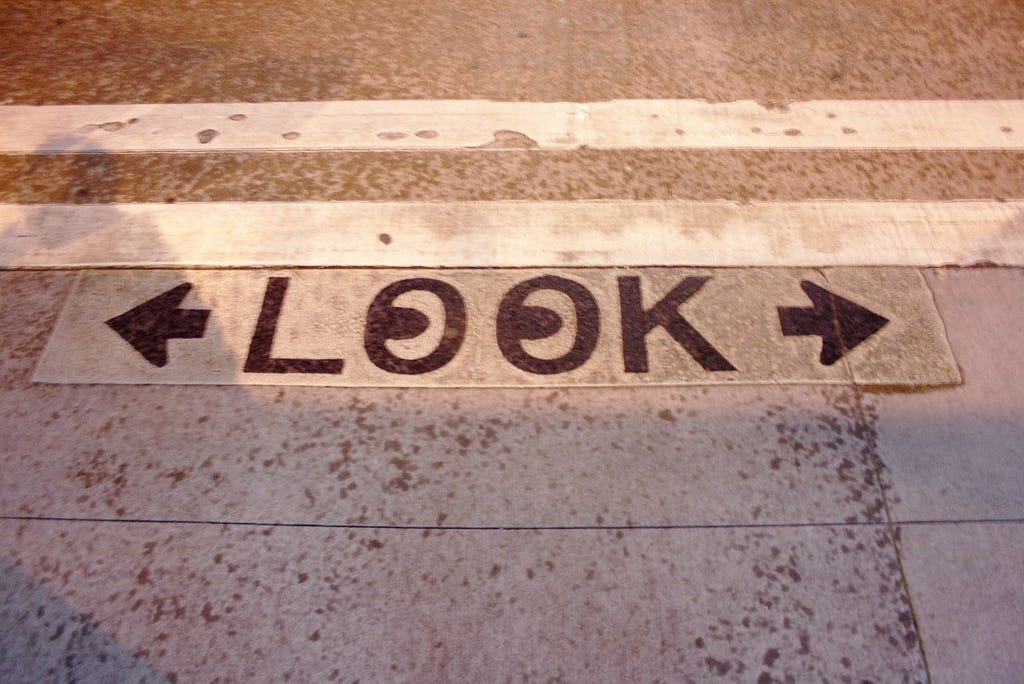
“God bless you,” Charlie said. “You gonna make it. I love you.” I watched this for some time, and then walked over to him.
“Are you a preacher?” I asked.
“I’m a prophet,” he said.
“God put me out here to reach out to people no matter what their problem. No matter what’s goin’ on with them. People come to me with all kinds of problems. They on drugs. They man left. They can’t have sex no more. They lost 2.8 million dollars up in some office. They lost they house. I’m just out here to pray. They come up to me like this. See? I don’t ask em. They just come.”
A woman walked by, then hesitated. “What you cryin for?” he said.
“Oh, nothing,” she said. But she stopped walking.
“No you cryin for somethin’,” he said. “What happened? He left?”
“No, he’s just bein disrespectful. He drank some whiskey on Sunday. And since then he’s been a jerk. He’s just screamin and cussin at me in front of the baby.“
“That’s where the tears comin’ from then,” Charlie said. He hugged her. She smiled, wiped her tears. All around us, people were walking by. But right here, on this street corner under a sky scraper, was a corner of civility. Someone cared.
Adam told me later that this Charlie guy was anti-gay. He was a nut. A maniac. At the time though, I didn’t know any of that. I was just watching him. He might have been a maniac. It made sense. Who else would stand on the corner and care about everyone that walked past? Who else but a crazy person would hug you and tell you it was going to be okay?
“That’s how it is with people walking by,” he said. “God knows them all. There is nobody out here He doesn’t see, whether they’re the richest or the poorest. He knows them all. Sure as He knows the drops of rain. You got a prayer request, brother?”
“I do, actually,” I said. I thought of someone I knew who had become homeless.
“What is it? Drugs?”
I paused. “Basically,” I said. He grabbed my hand hard, and prayed.
Who would do that? Who else but a crazy person would ever do that?
This article has been reformatted and amended from its original publication to reflect a change of focus in the narrative.
